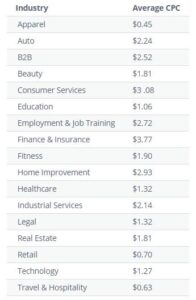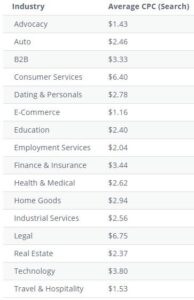A client asked me recently about the differences between Facebook Ads and Google Ads. But ultimately, they wanted to know which platform is going to return the most money.
It’s a question I get asked a lot from business owners wanting to profitably advertise online.
This will depend on the type of product or service you’re offering and what your goal is. Is it to get sales fast or is it to build brand awareness?
It’s helpful to understand the difference between both platforms before making a decision. Let’s dive in.
From an advertiser’s perspective, the most significant difference comes down to intent. The intent of someone logging into Facebook is very different to someone searching on Google.
There are 2 main reasons people spend time on Facebook:
Facebook Ads = Paid Social (Low Purchase Intent)
Rarely do people go to Facebook to search for a product or service. If they do, it’s typically to interact with a brand they already know or to get a recommendation from someone they trust.

But most of the time when someone is researching a product, service, or solution to a problem – they go to Google. This often results in a purchase or enquiry.
Google Ads = Paid Search (High Purchase Intent)
Someone searching for “After Hours Chiropractor” is highly motivated to get relief from their pain. If they click on one of your ads and like what they see on the landing page, there’s a strong chance they’ll make an immediate booking.
Another way to think about it:
Google is intentional marketing. Someone goes to Google with the intention to buy or research a product or service. They see your ad. Boom! A sale.
Facebook is interruption marketing. Someone is scrolling their newsfeed and is interrupted by your eye-catching ad. Kind of like TV ads on steroids. But unlike old-school spray and pray advertising, you can be WAY more specific in who you show your ads to.
Both companies are obnoxiously large and are a part of everyday life for most people.
Google dominates search
Facebook dominates social
So you can find most age groups and demographics on both. Statistically, your customers use both.
But again, think of intent.
Facebook is a combination of social and distraction (think memes, cat videos). So the heaviest users of Facebook (and Instagram) tend to skew younger and be more impulsive.
Googles MO is to help you find the most relevant information. It’s where you conduct research to help you solve problems and make decisions. So heavy Google users tend to skew older and be more professional.
The takeaway from this is Facebook is better for B2C – especially if your product or service is for younger audiences and/or can be an impulse buy.
Google is better for B2B and products/services aimed at older audiences. Especially if it’s something that requires research before making a decision.
Google is also better for products and services that people only buy when they have a need (eg. a spine adjustment, plumbing work). Facebook is better for wants and impulsive buys that don’t need much research (eg. a funny T-Shirt, fidget spinners).

So how do you target these audiences with your ads?
On Google, you target your ads towards people searching for specific keywords and key phrases. Going back to the chiropractor example… if you’re a Chiropractic Clinic based in St Kilda, Melbourne – you would target keywords like “Chiropractor in St Kilda” or “St Kilda Chiropractic”.
You can also target certain areas. Ie you could specify that you want your ads to show only to people in St Kilda and surrounding suburbs. Then target broad keywords like “Chiropractor” or “Back Pain Relief”. If the searcher is in the location you specified, your ads will show up at the top of their search results (depending on competition and how much you bid on the keywords).
This article is focused primarily on Google Search Ads, but you can also show your ads on Google’s Display Ads Network, Google Play, Google Shopping, and Youtube. Local businesses and service-based businesses should focus on Google Search, while eCommerce businesses should test Google Shopping Ads and even Youtube if they have the video chops.
Facebook on the other hand is not keyword based. You can’t be as targeted in terms of buying intent, but you can get far more specific in terms of demographics, behaviours, and interests. This is where Facebook sets itself apart and is incredibly powerful. Especially for growing your brand, and for finding new customers who were not aware of your product/service and would never have searched for it on Google.
For example, you’re selling a carry bag that is stylish, versatile, and made from 100% recycled materials. A lot of people would be interested in this product but might not do a Google search for “100% recycled carry bag”. But on Facebook, you could target groups of people who would most likely be interested.
Eg. you can target People who…
Are interested in well-known bag brands
AND are interested in environmental causes
AND use public transportation
AND have purchased something online recently.
Through Facebook’s Ads Manager, you can display ads on Facebook’s newsfeed, stories, Messenger, Instagram, Whatsapp and Audience Network. These ads can target each stage of the buying cycle – Awareness, Consideration, Conversions. Plus you can test many different ad types and creatives. Page Like Ads, Post Engagement Ads, Carousel Image Ads, Video Ads, Lead Ads – just to name a few.
Because of the vast array of advertising options, Facebook Ads can be overwhelming for newbies. But as Facebook’s AI gets smarter, you can select “Automatic Placements”, tell Facebook what the goal of the ad is, and Facebook will take care of the details. You can then focus on creating amazing ads and showing them to the right audiences.
In the old days of advertising, measuring the performance of your ads against the cost could be a frustrating exercise. Just how many sales did that radio ad bring in? Where did they hear about us first?
Today with the ability to track pretty much everything on your website with Google Analytics, it’s a lot easier to get an accurate idea of how your ads performing.
Based on experience, the cost of advertising tends to be lower on Facebook Ads than Google Ads. We’ve often seen the CPC for campaigns on Facebook to be under $1.00 per click. But that rarely happens on Google Ads. In fact, on Google advertisers can spend over $50 for a single click in really competitive industries! But on Facebook, you can pay as little as $0.25 per click depending on the CTR and targeting factors for your ad.
Ok, that’s on the extreme end of the spectrum, but if you look at the averages, Facebook is still significantly cheaper. The average cost per click (CPC) for Facebook Ads across all industries is $1.72. For Google Ads, the average cost per click across all industries is $2.69 for search.
Here’s a breakdown of the average CPC’s for each:
Facebook Ads Average CPC

SOURCE: Wordstream
Google Ads average CPC:

SOURCE: Wordstream
On the face of it, it appears that Facebook is the clear winner for cost. But on Google, due to the high user intent, a click is more likely to convert into a lead or a sale, so your cost-per-acquisition can often be lower.
For ads aiming to convert visitors into sales, Google can actually work out cheaper in terms of cost-per-acquisition.
But for other types of ads – brand awareness, engagement, video views, traffic to a page, and even lead gen – Facebook will typically get you greater results for less money.
So after all that…Facebook or Google? Which ads platform is right for your business?
Are you an ecommerce company and want to grow your Brand Awareness and show off your amazing new product? Then Facebook is where you should be.
Are you a B2B company and want to start generating leads and sales immediately? Then Google is your best bet.
Another way to think about distributing your budget is Marketing vs Sales. You could potentially use Facebook to build your brand awareness, show your product or service in action, and then use Google to go after those high-buyer-intent keywords to catch people ready to make a purchase.
By being in more places at once you increase the likelihood your brand will stick in their mind, so that they’ll choose you over your competition when they pull out their credit card.
Have you advertised on Facebook or Google? What has your experience been like and what ROI did you see?
Let us know, and if you’re looking for a PPC Ads Agency in Melbourne to manage your ads and help your business grow, get a free strategy session here.